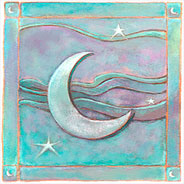Astrology
“The conviction that statistical research should constitute the final arbiter of all positive knowledge of the world rests on the no longer tenable assumption that the world can ultimately be known only as a detached object to be mechanistically tested and measured, rather than a multi-dimensional, complexly unfolding relational field to be participated in with all our human faculties.” ~ Richard Tarnas in Cosmos and Psyche
Astrology is a valuable tool for insight and healing, both on a personal and a global level. Once the jealously guarded province of royalty and generals, since the Age of Enlightenment it has generally been considered to be nothing more than a superstition, relegated to the tabloid newspapers. But over the past 35 years or so, thanks to the work and writings of a number of highly educated and psychologically astute astrologers such as Richard Tarnas, Noel Tyl, and Liz Greene, astrology has been undergoing a renaissance. Planetary placements and aspects have been studied with reference to modern psychological theory, and computers have offered greater scope for research and communication.
Despite the difficulty of fitting the concepts of astrology into the current scientific paradigm, those who study and work with astrology for any period of time find it to be a valuable tool for understanding spiritual, emotional and behavioral needs as well as a way of acquiring insight into events both past and future. Even the most skeptical, if they take the time to investigate and learn astrology, are almost inevitably convinced that “something’s going on here…”
Many people—including a number of scientists, who should know better—object to astrology on the grounds that we cannot conceive of a mechanism for it. But even that paragon of skeptics, Carl Sagan, noted: “That we can think of no mechanism for astrology is relevant, but unconvincing. No mechanism was known, for example, for continental drift when it was proposed by Wegener. Nevertheless, we see that Wegener was right, and those who objected on the grounds of unavailable mechanism were wrong.”
There are clear parallels between the insights that have been expressed by mystics through the centuries and the current thoughts of many quantum physicists about the nature of existence. Both seem to be pointing to a Universe that is a connected Web, with consciousness being an integral part—if not the Source—of all existence. Patterns within patterns weave and wend throughout this great Web, and patterns we see in the horoscope reflect those that are at work within our human lives.
Astrology helps us interpret our personal and collective experiences. Personal astrology, based on the date, time and place of birth, reflects the patterns of an individual life, while the continuing movements of the planets, reflected against the background of the birth chart, highlight the nature of the triumphs and challenges we face as we age within the spiral of our years. Astrology columns in newspapers that feature divinations based on sun signs are obviously so broadly applied as to be meaningless. The personal horoscope, however, illuminates an individual life with great clarity, pinpointing specific issues of importance in each life and suggesting paths to healing and integration. Mundane astrology, the astrology of politics and events played out on a world stage, gives us insight into issues that are active in our larger communities, while horary astrology focuses on answering specific questions.
The age of space travel and computers has given astrologers even more depth of understanding and awareness of how the planets relate to the human condition. The ancient insights have been validated, refined and expanded through modern discoveries. Astrology in the 21st century has become a remarkably useful tool for navigating life and understanding events, and has much of value to offer to us all.

